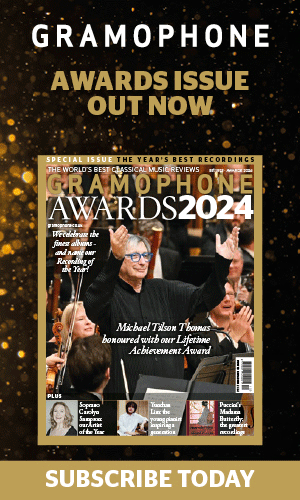Lifetime Achievement Award
A prolific recording artist and much-loved conductor, James Jolly pays tribute to Neeme Järvi
‘I sometimes wonder’, an orchestral player told me earlier this year, ‘whether Neeme Järvi doesn’t actually prefer making records to giving concerts.’ It’s a suggestion that doesn’t go away when your meet the man himself: he’s much happier discussing the recordings he’s made than the relatively narrow opportunities the concert hall offers. Out of curiosity, I spent about a half an hour listing all the composers whose music Järvi has recorded – my grand total came to 111 (and I’m absolutely sure I must have missed quite a few). It’s not just an extraordinary tally, resulting in well over 400 individual releases, but the breadth of repertoire is unequalled. (Karajan may have made more recordings and Svetlanov came close in the number of – mainly Soviet/Russian – composers represented. But no one, surely, has embraced such an international repertoire.)
Neeme Järvi appeared on the musical scene at about the same time as the CD, and the timing couldn’t have been better. In BIS and Chandos he had record companies who, in those days of the headily blank canvas of the CD catalogue, decided to do something a bit different. Rather than take on the Karajans and Soltis in the central repertoire, they decided to explore music that the majors would take some time getting around to, if at all. And so it was the Sibelius and Prokofiev symphonies rather than the Beethoven and Brahms, Stenhammar rather than Schumann. And in Järvi they had a conductor who simply thrived in the recording studio, and his producers would go home after a session with hours of music-making rather than yards of tape of the conductor lecturing the players. Järvi’s modus operandi would be to say to his players, as they confronted unfamiliar music, ‘Watch me. Follow me’ – and they did, often playing better than they ever thought was possible. As Neeme’s son, Paavo, points out, ‘His players trust him because he’s a reliable conductor, and not in a boring way. If he needs to do something, or change something in the minute, he can fix it quicker than anyone else because he has the technique. Another thing is that I don’t know a single musician who just wants to get the job done as efficiently as possible. They want to make music and feel as if they’re in the middle of some live process where there’s some kind of creative current flowing.’
Go back to 1985 and his (pre-Royal) Scottish National Orchestra recording of Prokofiev’s Sixth Symphony for Chandos, and you’re confronted by his musicianship at its very finest (and, indeed, by Chandos’s classy production values). The string lines have intensity and punch, but they also have a flexibility that feels like it’s being moulded in the moment by the conductor: there’s a powerful tensile strength to the playing that feels so right for this, Prokofiev’s greatest symphony. As Robert Layton wrote as the recording took our Orchestral Award in 1985, ‘An orchestra of the second rank playing with total zest can often be more thrilling than a luxury one coasting along on automatic pilot.’ (It was a comment that, apart from stirring up much indignation from north of the border, had a prescience about how the industry would evolve over the next decade: soon ‘orchestras of the second rank’ – and third, fourth and fifth – would, in tandem with the loss of the super-maestros, close the gap with the greatest because of their commitment, appetite and passion for the rare.) Neeme Järvi would become a key player in this Brave New World, championing the rare and unknown and not just turning in decent run-throughs but delivering proper performances (an up-and-coming conductor recently asked me if it was true that Neeme Järvi could open a score and, more or less at first sight, give a proper reading. I suspect the answer is ‘Yes’!).
Whether in Scotland, Sweden, The Netherlands, Switzerland, the States or his native Estonia - all countries in which he’s held music directorships – Järvi has continued to explore and champion music that needed to be heard. One of his earliest and still most impressive acts of musical advocacy was his series for BIS of the 10 symphonies of Eduard Tubin, music that offers huge rewards but was also for many of us an early gateway into the extraordinarily rich range of music from Estonia. And his relationship with Arvo Pärt and his music is integral to both men’s lives
At 81 Neeme Järvi remains an inspiration. Orchestras love working with him because he brings out the best in every player. Young musicians love him because he knows his craft completely; not for nothing did he learn his trade in Leningrad, watching and absorbing the artistry of conductors like Rabinovich, Sanderling and Mravinsky. To his two conducting sons, Paavo and Kristjan, he is the father any budding musician must dream of. His impact on music, and music on record, is unique.

Gramophone Digital Club
- Digital Edition
- Digital Archive
- Reviews Database
- Full website access
From £8.75 / month
Subscribe
Gramophone Full Club
- Print Edition
- Digital Edition
- Digital Archive
- Reviews Database
- Full website access
From £11.00 / month
Subscribe
If you are a library, university or other organisation that would be interested in an institutional subscription to Gramophone please click here for further information.






